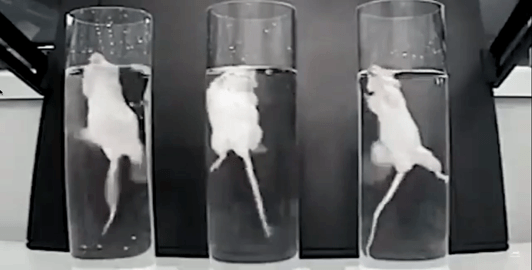PETA Scientist Publishes Paper Showing Why Agencies Should Sink the Forced Swim Test
For Immediate Release:
June 27, 2024
Contact:
Tasgola Bruner 202-483-7382
PETA neuroscientist Emily Trunnell, Ph.D., is spearheading a worldwide effort to end the use of two cruel and widely debunked experiments on animals and is now the lead author of a new paper published in the influential journal Regulatory Toxicology and Pharmacology today.
In the paper, titled “The Need for Guidance in Antidepressant Drug Development: Revisiting the Role of the Forced Swim Test and Tail Suspension Test,” Dr. Trunnell and the coauthors recommend that pharmaceutical regulatory authorities issue guidance against the use of the forced swim test and the tail suspension test.

In the forced swim test, experimenters drop small animals into inescapable containers filled with water and watch as the terrified animals paddle furiously, desperately trying to keep their heads above water. In the tail suspension test, experimenters suspend mice upside down and tape their tails to a horizontal bar. The animals struggle to right themselves, attempting to pull their bodies up, holding on to the tape affixed to their tails—only to drop back down again and resume their exertion.
“The data are clear: The forced swim test and the tail suspension test fail humans suffering from depression and torment tiny individuals,” says Dr. Trunnell. “PETA’s paper offers pharmaceutical industry policymakers a peer-reviewed blueprint for how to finally ensure that these crude experiments are no longer used—for everyone’s sake.”
Research suggests that the forced swim test may be less reliable than a coin toss in predicting whether a drug would treat depression in humans, so the paper advises that the International Council for Harmonisation of Technical Requirements for Pharmaceuticals for Human Use do the following:
- Establish a working group that will examine whether current tests such as these are fit for purpose, set standards for testing the effectiveness of drugs before they get to human trials, and suggest superior non-animal research methods for pharmaceutical companies to use instead
- Accept public comments on the working group’s recommendations
- Use the above information to develop policies and guidelines for pharmaceutical companies to test whether drugs will be effective in treating human psychiatric conditions
Several companies, including Johnson & Johnson and Bayer, as well as a number of research universities, including King’s College London and the University of Adelaide in Australia, have banned the forced swim test. PETA is now urging pharmaceutical giant Sanofi to do the same.
The paper includes contributions from PETA U.K. and PETA Germany scientists, the Physicians Committee for Responsible Medicine, Animal-Free Science Advocacy, and the New Zealand Anti-Vivisection Society.
PETA—whose motto reads, in part, that “animals are not ours to experiment on”—points out that Every Animal Is Someone and offers free Empathy Kits for people who need a lesson in kindness. For more information, please visit PETA.org or follow the group on X, Facebook, or Instagram.


